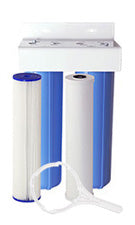What is in our water?

Most tap and well water in the U.S. contain moderate to heavy levels of contamination from industrial and environmental pollution. All sources of water whether it be a lake, river, glacier or well, contain some level of contamination. Contaminants range from naturally occurring minerals to man-made chemicals and byproducts. Water from surface water (river or lake) can be exposed to acid rain, storm water runoff, pesticide runoff and industrial waste. Water from groundwater (private wells or public water supplies), can be contaminated by disease-producing pathogens, leachate from landfills and septic systems, hazardous household products and agricultural chemicals.
The majorities of contaminant levels are not high enough to cause immediate sickness but are more likely to cause chronic health effects. This means effects that occur long after repeated exposure to small amounts of a contaminant.
Unwanted Substances in Our Water
- Microbial Pathogens – Disease producing micro-organisms, which includes bacteria, viruses, parasites.
- Organics
- Trihalomethanes, byproducts formed when chlorine in treated drinking water combines with naturally occurring organic matter.
- Pesticides, herbicides, insecticides and fungicides
- Volatile Organic Chemicals (VOCs), which include solvents, degreasers, gasoline additives, etc.
- Inorganics – Toxic metals such as arsenic, barium, chromium, lead, mercury, etc.
- Radioactive Elements - Radioactive contaminants that result from the decay of uranium in soils and rocks.
- Scale – Hard water minerals such as calcium and magnesium cause scale buildup to attach on surfaces like pipes and appliances to cause lime deposits.
Only a few of the contaminants listed above are regulated by drinking water standards. This stresses the importance of whole house water filtration, to protect you from the wide range of contaminants in your water source.
2 Most Popular Types of Whole House Water Filters

Installing a whole house water system can solve a wide range of problems affecting your water quality, taste, or appearance of the water. Whole house filtration systems remove contaminants from your water through a filter connected to your water line. All of the water coming into your house will pass through the filter before being routed to faucets, toilets and appliances in the house. The types of contaminants that you will need to remove or treat your water with will vary based on whether you receive water from a municipal system, well, or spring. Generally, those on city water are recommended to use a whole house carbon filtration system for general multi-purpose whole house purification. Carbon filtration is effective in removing chlorine, chloramines, odor and VOCs to provide chemical free water throughout your entire home. If you have specific water contaminant issues such as iron, fluoride, sediment, or bacteria, you will you need a whole house system catered to removing that particular contaminant. For example, if you have orange and brown iron staining around the fixtures in your home, you will need a whole house iron filter to remove the staining throughout the home. A whole house softener does not work as a filter, but works to soften hard water. A whole house softener is recommended if you require soft water for a scale free environment and spotless glassware. A softener can be combined with any whole house filtration system and work together to provide clean and soft water throughout every faucet.
There are two main types of whole house systems. The first type of system is a heavy duty filtration system. This is the highest performing contaminant removal system because of the large amounts of filter media used. The media is placed in a tank about 50” tall and provides you with specific contaminant protection for 5-10 years before the media needs to be replaced. A second type of system is a standard capacity water cartridge. These water filter cartridges are placed inside durable filter housings to treat the contaminated water throughout the entire home. The filters are typically 4.5” Diameter by 10” or 20” Height and are replaced annually. These standard capacity systems are more affordable, but do require a bit more maintenance. To learn more about our heavy duty filtration systems and standard whole house filter systems view a variety of our whole house systems.
Benefits of a Whole House Water Filter
- Clean, filtered water emerges from every water source in the house
- Healthier showers & baths
- Extended life of water using appliances and household pipes
- Softened water with scale free showers and spotless glasses
- Softer, brighter and longer lasting clothing
- Healthier skin and hair, free of contaminants
While water from a municipal source is treated, it is still exposing you to a handful of contaminants. A whole house system provides you with extra protection in every outlet of your home. Contaminants can be absorbed through the skin and inhaled from our lungs, so it is extremely important to be protected throughout the entire home. If you have no special water contaminant issues then a whole house carbon filtration system is recommended for general multi-purpose whole house purification. If you have special water concerns then you would need a whole house system dedicated to treat that problem. Enjoy the health benefits of a whole house water filter and the peace of mind that comes with clean water.



